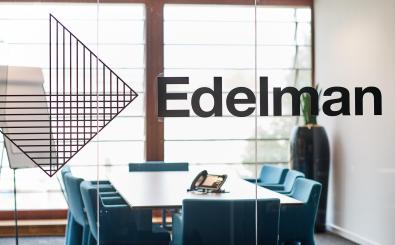Love alone is no longer enough, trust defines the new brand value
-
Brand trust is more important than love: 80% of Germans say that trust in a brand is decisive or important for a purchase decision, which is 8 percentage points higher than love (72%)
-
In social responsibility: 79 % of Germans expect brands to take one or more measures that go beyond their actual product and business
-
Trust drives growth: 56 % of respondents say they will support a brand they fully trust by making a purchase – by buying a new product or service, even if the option is not as favourable as others
Frankfurt am Main, 9 August 2021: Trust is becoming increasingly important for brands and, against the backdrop of current social developments, a gamechanger. The results of the Edelman Trust Barometer 2021 Special Report, Trust, the New Brand Equity, show that brands have acquired a special role in solving social challenges. Those who can secure people's trust will also be more successful. This is shown by the results of a survey of over 14,000 people in 14 markets on the development of brand trust.
Trust as a gatekeeper for purchase decisions
Becoming a "love brand" was and is the big goal for many companies. But in recent years, love alone is no longer enough. The Edelman Trust Barometer clearly shows that trust in a brand (80%) is more important than love (72%) when making a purchase or usage decision for those surveyed in Germany, and can even be a dealbreaker. Good value for money (84 %) and the best quality (84 %) also have a major influence. German respondents have clear feedback for companies that do not fulfil this with their brands: 38 % say that even if they loved a brand, they would give it up if they did not trust the company behind it.
Brands are in a change of values: Achieving more together
The reasons for the relevance of trust in a purchase decision are complex. Almost half (49 %) of German respondents say that trust has become more important in all areas of life. Other arguments include the increasing influence of brands on the environment (46 %) and economic recovery (32 %) as well as the increased trust in brands that protect people during the corona pandemic (23 %).
That respondents care about society, not just themselves, is shown by the answer to whether respondents in Germany are more attracted to brands that have more of a focus on "we" than "me": 75 % prefer brands that focus on making the world a better place.
Brands faced with demanding expectations
Just how clear this expectation is shown by the various measures brands have to take into account before they are considered for purchase: 79 % of Germans expect brands to take one or more measures that go beyond their actual product and business. These include addressing social and political challenges, honestly addressing uncomfortable truths, being transparent and thus bringing about positive change in society, and standing up against misinformation.
For example, while brands were specifically required to take an active role in combating the pandemic, respondents in this country now go a step further: 75% say they can force brands to change the company's social impact. This includes changes such as reducing their Co2 footprint (42%), improving labour practices (40%), using environmentally friendly materials (40%), manufacturing products in their own country (33%), paying their fair share of taxes (33%), getting the CEO to speak up (28%), firing the CEO (24%) and making the workforce more diverse (23%).
Cultural and social relevance: the game changers for brands
For brands, it is not enough to adorn themselves with promises to win trust in the long term. Only if they take a clear stand, even on highly political issues, is the advantage for them greater than the risk. For example, there is a 3.5x more positive effect on Germans' buying behaviour if a brand commits to championing climate change. 47% say they would then buy the brand, while 13% would rather not consider a purchase.
"Trust is elementary and long-term. It allows risks to be taken but is at the same time a promise that the future will be shaped in the interests of the supporters and society. Factors such as quality and value for money form the basis, trust and cultural relevance become game changers,"
says Claudia Graf, Managing Director Brand Edelman Germany and Food & Beverages Lead Edelman EMEA.
Trust as a new brand value
Over half of those surveyed in this country (56%) say they will support a brand they fully trust by making a purchase, i.e. buying a new product or service even if the option is not as favourable as others. Further, 52% say they will advocate for a trusted brand in private and on social media, and 49% will remain loyal to the brand even if something goes wrong. Another 26% will interact with the brand by participating in activities it initiates, sharing personal data with it, or allowing online tracking.
"For brand managers, it is time to embark on a transformation from “love brand” to “trust brand”. Because in order to continue to play a relevant role in people's lives, brands will have to take a stand in the future and respond to the needs of individuals and society. Only those who combine this with their own corporate philosophy will build trust in the long term. And only where trust is the basis, is love long-term,"
says Claudia Graf.
2021 Edelman Trust Barometer 2021 Special Report: "Trust the new brand equity"
The Edelman Trust Barometer 2021 Special-Report: Trust the new brand equity is a report of the Edelman Trust Barometer 2021. The survey was conducted by Edelman Data & Intelligence (DxI) between May 12 and June 2. 2021 and included 14,000 respondents in 14 markets: Brazil, Canada, China, France, Germany, India, Japan, Mexico, Saudi Arabia, South Africa, South Korea, UAE, the UK and the US, with 1,000 respondents in each market. All data is nationally representative by age, region, gender and additionally by ethnicity in the UK and US.
Press contact
Anna-Lena Schildt, Senior PR & Marketing manager of Edelman Germany
Tel.: +49 (0) 40 80 90 36 770, E-Mail: Presse-DE@edelman.com


